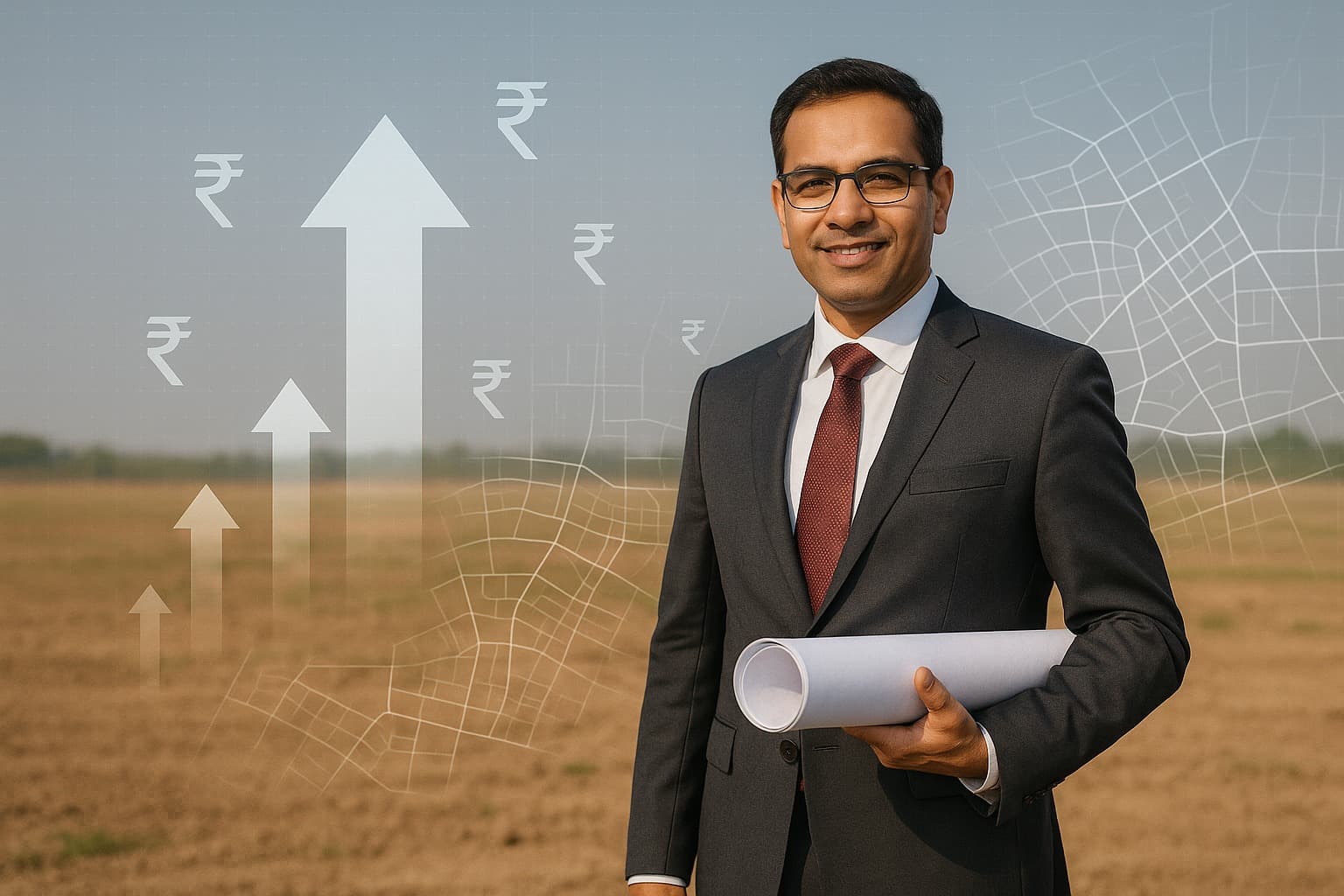Why Land is Still a Golden Asset in India: A 2025 Perspective
Summary
In 2025, land in India remains a golden asset due to urbanization, infrastructure growth, and scarcity. It offers long-term appreciation, flexibility, and serves as an inflation hedge, making it a secure investment.

Land: The Timeless Investment
In a country like India, where cities are expanding at a breakneck pace and rural areas are slowly transforming into urban hubs, land remains one of the most sought-after assets. Unlike flats or commercial spaces, land is tangible, finite, and historically resilient against market fluctuations. While real estate markets see booms and corrections, land values rarely collapse entirely, making it a safe harbor for investors seeking long-term wealth creation.
Investing in land isn’t just about financial returns—it’s about control, flexibility, and opportunity. You can develop it, sell it, lease it, or hold it as a future asset. In 2025, with urbanization, industrial corridors, and smart city initiatives, land continues to attract both first-time investors and seasoned buyers.
The Unique Appeal of Land
Unlike apartments or commercial offices, land has a simplicity and versatility that appeals to investors:
Low Maintenance: Land does not depreciate with age, nor does it require regular maintenance costs like buildings do.
Unlimited Potential: You can use it for residential, commercial, industrial, agricultural, or mixed-use purposes depending on location and zoning laws.
Finite Resource: Land is limited—cities expand, agricultural areas diminish, and industrial corridors grow. The scarcity factor naturally increases its value over time.
This makes land a tangible, safe, and flexible investment, particularly when compared to volatile stock markets or speculative commercial spaces.
Historical Trends in Land Appreciation
Over the last decade, land in India has consistently appreciated, especially near urban and semi-urban areas. For instance:
Peripheral Urban Areas: Land near expanding metros like Pune, Bengaluru, and Hyderabad has shown steady growth of 8–12% annually.
Industrial and IT Corridors: Areas near industrial hubs and IT parks have experienced sudden spikes in valuedue to corporate expansions.
Agricultural to Residential Conversions: Rural lands converted into residential or commercial plots often see value jumps up to 3–5 times within a few years.
Even when property markets cool down, land tends to retain intrinsic value, providing a hedge against inflation and economic uncertainty.

Land vs Flats: Why Investors Prefer Land
While apartments and commercial units offer immediate utility and rental income, land has unique advantages:
Lower Entry Costs: You can invest in plots in emerging neighborhoods at relatively low prices, compared to high-priced flats in metro cities.
Freedom to Develop: Investors can construct residential or commercial buildings when the market is favorable.
No Maintenance Costs: Unlike apartments, land does not require upkeep, society charges, or property management fees.
Long-Term Appreciation: Well-chosen land appreciates steadily over decades, often outperforming other forms of property investment.
In essence, land is a flexible, long-term asset that grows quietly and consistently, rewarding patient investors.
Factors That Make Land a Golden Asset in 2025
Several factors make land particularly appealing this year:
1. Urbanization and Infrastructure Development
India’s urban population is projected to increase steadily in the coming decades. With new expressways, metro lines, and airports, previously remote land parcels are becoming prime real estate locations. For example, land near Navi Mumbai International Airport or the upcoming Pune Ring Road is expected to multiply in value over the next 5–10 years.
2. Government Initiatives
Government schemes like Smart Cities, Industrial Corridors, and Affordable Housing indirectly boost land demand. Investors who acquire land near these zones can benefit from:
Increased demand for residential and commercial projects
Rising infrastructure-led property prices
Higher rental and resale values
3. Scarcity and Finite Supply
Unlike buildings, land cannot be manufactured. With every passing year, urban expansion reduces the availability of prime plots, driving prices upward. In a country with 1.4 billion people and rising housing demand, scarcity ensures that land remains a golden, appreciating asset.
4. Inflation Hedge
Historically, land has been one of the best hedges against inflation. While the value of money decreases, the intrinsic value of land rises, protecting long-term wealth. This is particularly important in 2025, as investors seek safe, inflation-resistant assets in a volatile economic environment.
Tips for Smart Land Investment
Investing in land is not just about buying any plot—it’s about choosing the right location, legal checks, and timing.
Location is Key: Look for land near urban hubs, industrial corridors, highways, or metro expansions.
Legal Due Diligence: Verify land titles, zoning approvals, encumbrances, and environmental clearances.
Future Development Plans: Analyze upcoming government projects or private infrastructure initiatives nearby.

Long-Term Perspective: Land investment is rarely for quick profits. A 5–10-year horizon often yields the highest returns.
Diversify Across Cities: Consider Tier-1 and Tier-2 cities to balance risk and opportunity.
Smart planning ensures your land investment remains profitable, safe, and hassle-free.
Real-Life Examples
Pune’s Hinjewadi IT Corridor: Early land investors in the 2000s have seen 100–200% appreciation in two decades.
Navi Mumbai: Land near the international airport has gained tremendous value, turning small plots into multi-crore assets.
Bengaluru Industrial Hubs: Peripheral areas like Devanahalli or Whitefield have shown steady long-term growth as IT and manufacturing companies expand.
These examples highlight that land, if chosen wisely, can generate life-changing returns.
Why Land Will Always Remain a Golden Asset
Unlike stocks, mutual funds, or speculative commercial projects, land has tangible value, scarcity, and flexibility. Even in economic slowdowns, land prices may stabilize rather than collapse, providing security for investors.
Moreover, land ownership in India carries cultural significance, as it symbolizes stability, heritage, and wealth. Families have traditionally invested in land, not just for financial returns, but also for legacy and long-term security.
Conclusion
In 2025, land continues to shine as a golden asset for Indian investors. With urbanization, infrastructure development, scarcity, and long-term appreciation, it offers a combination of security, growth, and flexibility unmatched by other investment options. For first-time investors or seasoned buyers, land provides an opportunity to build wealth quietly yet steadily, acting as both a financial cushion and a future-ready asset.
Whether it’s a small plot near an upcoming industrial corridor, agricultural land for development, or premium urban land near IT hubs, land remains the ultimate long-term investment in India.
Summary (100 Words)
Land in India remains a timeless, golden investment, prized for its scarcity, stability, and long-term appreciation. Unlike apartments or commercial spaces, it requires minimal maintenance, offers flexible development options, and serves as a reliable hedge against inflation. Urban expansion, infrastructure projects, and government initiatives continue to boost land demand, ensuring steady value growth. Investors benefit from careful location selection, legal due diligence, and a long-term perspective. Historical trends in cities like Pune, Bengaluru, and Navi Mumbai showcase land’s wealth-creating potential. For Indian buyers in 2025, land is more than property—it’s a legacy, security, and a smart path to financial growth.
